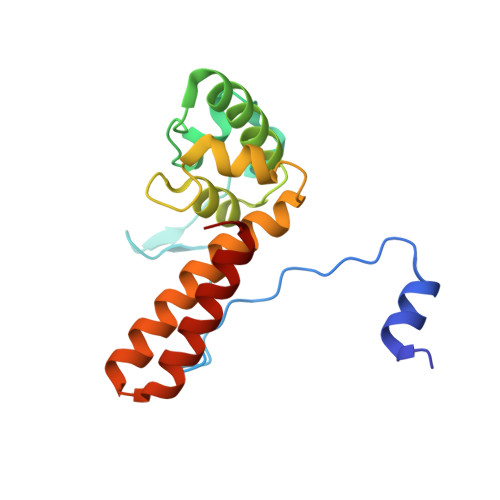Structural and mechanistic insights into the inhibition of type I-F CRISPR-Cas system by anti-CRISPR protein AcrIF23.
Ren, J., Wang, H., Yang, L., Li, F., Wu, Y., Luo, Z., Chen, Z., Zhang, Y., Feng, Y.(2022) J Biological Chem 298: 102124-102124
- PubMed: 35697070
- DOI: https://doi.org/10.1016/j.jbc.2022.102124
- Primary Citation of Related Structures:
7FIA - PubMed Abstract:
Prokaryotes evolved clustered regularly interspaced short palindromic repeats (CRISPR) and CRISPR-associated (Cas) proteins as a kind of adaptive immune defense against mobile genetic elements including harmful phages. To counteract this defense, many mobile genetic elements in turn encode anti-CRISPR proteins (Acrs) to inactivate the CRISPR-Cas system. While multiple mechanisms of Acrs have been uncovered, it remains unknown whether other mechanisms are utilized by uncharacterized Acrs. Here, we report a novel mechanism adopted by recently identified AcrIF23. We show that AcrIF23 interacts with the Cas2/3 helicase-nuclease in the type I-F CRISPR-Cas system, similar to AcrIF3. The structure of AcrIF23 demonstrated a novel fold and structure-based mutagenesis identified a surface region of AcrIF23 involved in both Cas2/3-binding and its inhibition capacity. Unlike AcrIF3, however, we found AcrIF23 only potently inhibits the DNA cleavage activity of Cas2/3 but does not hinder the recruitment of Cas2/3 to the CRISPR RNA-guided surveillance complex (the Csy complex). Also, in contrast to AcrIF3 which hinders substrate DNA recognition by Cas2/3, we show AcrIF23 promotes DNA binding to Cas2/3. Taken together, our study identifies a novel anti-CRISPR mechanism used by AcrIF23 and highlights the diverse mechanisms adopted by Acrs.
- Beijing Advanced Innovation Center for Soft Matter Science and Engineering, Beijing Key Laboratory of Bioprocess, State Key Laboratory of Chemical Resource Engineering, College of Life Science and Technology, Beijing University of Chemical Technology, Beijing, China.
Organizational Affiliation:
















